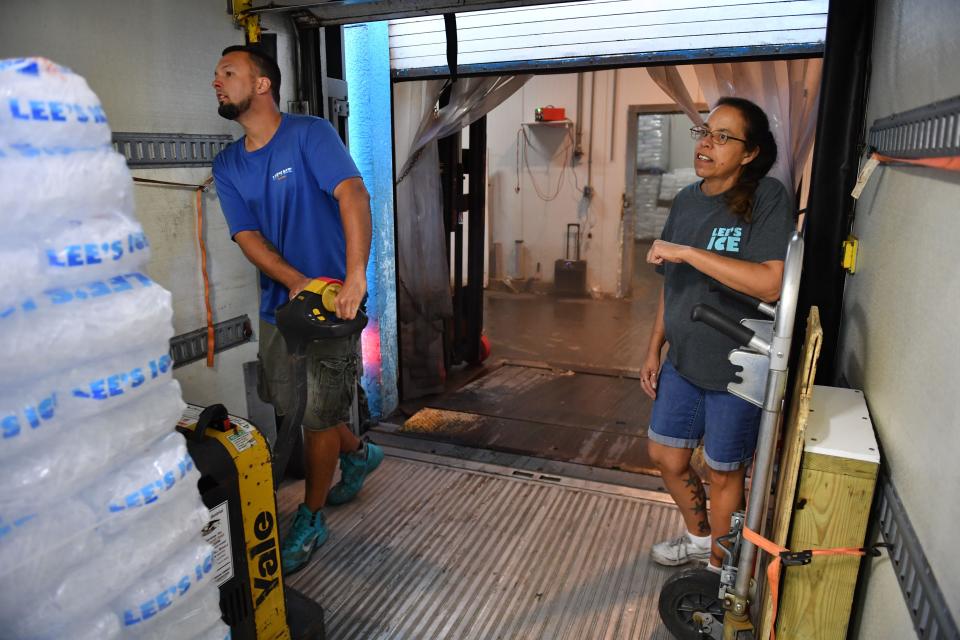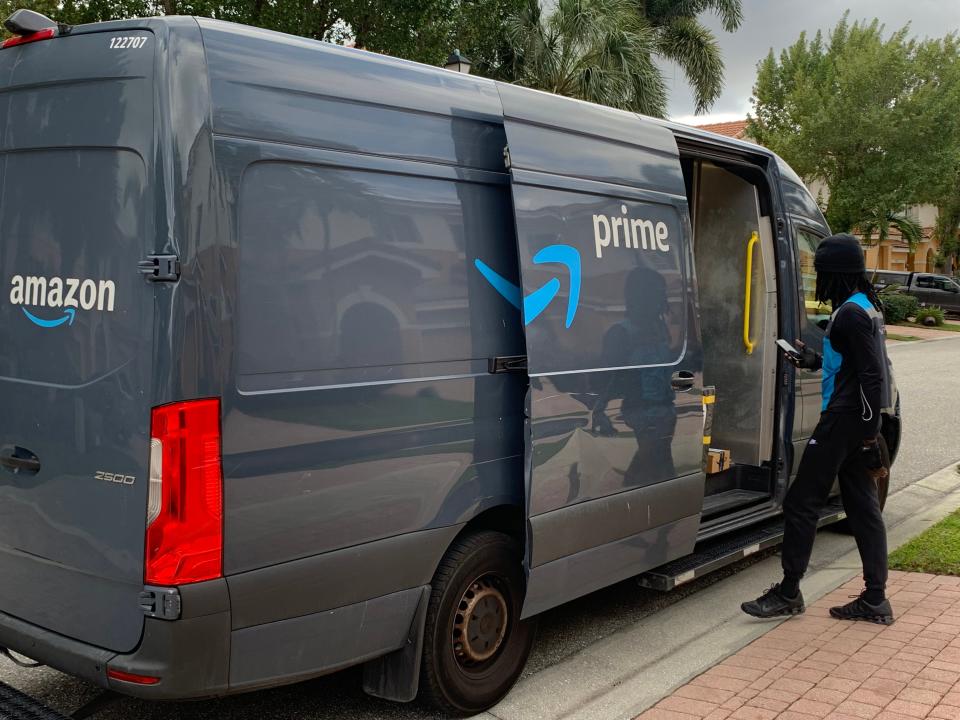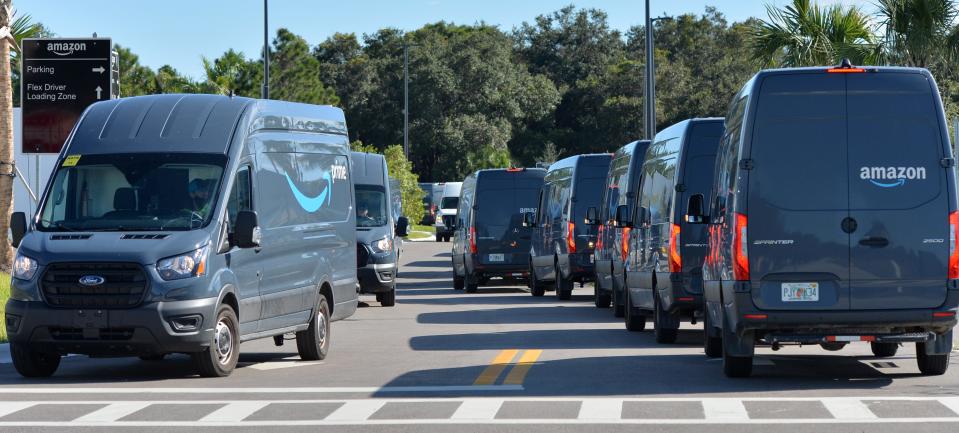Amazon’s growth is driving pressure on other Florida businesses that use delivery services
Editor’s note: This is part of an ongoing series of stories on the impacts of Amazon’s rapid growth in Florida, covering effects on real estate, small businesses, the job market, politics and more.
SARASOTA – Peggy Naughton has been looking for a delivery driver for the past three months and can’t find one anywhere.
The manager at Sarasota’s Lee’s Food Store & Ice said the business started delivering ice about 17 years ago as the tiny food market sold bigger bags than any other convenience store in the area. Restaurant owners quickly signed up for daily deliveries.
When that position became open in years past, Naughton said it was never a problem filling the vacancy. Now, those that do fill out an application don’t even show up for the interview, she said.
Across the country, and indeed in the state of Florida, a frustrating labor shortage stemming largely from job changes and early retirements fueled by the COVID-19 pandemic has been a hot topic among business analysts and leaders. Even as the pandemic has slowed, small businesses including stores, restaurants and hotels are struggling to attract and keep workers.
Amazon's push into Florida’s tight labor market garners mixed reviews
Will Amazon’s Flex delivery program be the company’s answer to the gig economy?

Transportation companies have been particularly hard-hit as e-commerce and mobile app-based companies such as DoorDash, Uber and Instacart have increased demand for drivers.
In a hot growth state like Florida, this has left driver-reliant companies competing for an ever-shrinking pool of available labor.
And Amazon, which, after ramping up to 59,000-plus workers in a matter of just a few years here, wants to double that in another few years, is driving more pressure.
“We can’t pay as much as Amazon,” Naughton said. “They’re a national company and we’re a local company.”
Driver shortages widespread across Florida
While the driver shortage has impacted companies, it’s not just the private sector that has a need for drivers.
In Palm Beach County, despite a starting salary of $65,000 a year, Palm Tran, the county’s public transit system, is having difficulty hiring drivers for its buses.
As of this report, the bus service has more than 30 driver vacancies. Palm Tran officials have started to pull drivers out of retirement to work, and existing drivers are working as much as 70 hours a week.

Meanwhile, on-time performance has suffered. From October to January, its buses were late 25% of the time.
Ridership is still well below pre-pandemic levels, but it has been increasing significantly in recent months – further exacerbating the driver shortage issue. In January, ridership was 509,548, an increase of 12% from January 2021. With gas prices at or above $4 a gallon, the last week of March and the first week of April this year saw ridership increase about 4% from the previous two weeks.
The bottom line: Palm Tran has fewer drivers to serve more riders. Officials are asking customers to be patient and understanding as they expect the effort to entice retired drivers to come back to work will help to improve the situation.
Waste Pro USA, a residential and commercial garbage collection company based in Florida, also is dealing with the demand for drivers.
“We have not been immune to the nationwide driver shortage and labor pool drought,” explained Melissa Catalanotto, a Waste Pro USA spokesperson. “The demand for qualified drivers and helpers continues to outpace the supply.”
Catalanotto said the company has hired a full-time recruiter to assist with job placement and has increased wages by as much as 30% to stay competitive and attract and retain talent. She said Waste Pro has also established an internal program to give drivers and other interested employees an opportunity to earn a commercial driver’s license at its state-approved testing site in Sanford.
Bus driver shortages and disruptions from COVID-19 have been impacting transportation departments throughout the state, including the Sarasota County School District, according to spokeswoman Kelsey Whealy.
“In mid-February alone, our team reported approximately 60-70 bus drivers/bus aides out for various reasons,” she said.
She said in an email in early April that the school district has had a challenge recruiting and retaining personnel “even more so now given the widespread, multi-industry need for the same types of drivers.”
“Our HR and transportation departments have been hard at work hosting general job fairs, school-specific job fairs, and even transportation-only job fairs,” she said. “The district is now offering paid training towards a driver obtaining their CDL, (commercial driver’s license) 100% employer paid benefits, and a salary starting at $15.67 per hour.”

The school district is even considering adjusting the county’s start times to help alleviate the problem associated with fewer bus drivers.
“The team is currently revisiting the proposed bell time change plan and making adjustments based on initial School Board feedback,” she said. “It will come before the School Board again on an upcoming meeting agenda. If approved by the School Board, this would become a permanent change effective at the start of next school year.”
Rob Harris, executive director of the Sarasota Area Manufacturers Association, called the labor shortage a “statewide issue that’s not going away.”
He pointed to demographics as one of the main culprits for the labor shortage that will not be solved anytime soon.
No easy solution to driver shortages
Baby boomers have begun to hit retirement age, leaving many positions open in companies across the country.
The next generation, Generation X, has 10 million fewer members than the baby boom generation. And the largest generation in the workforce today – millennials – “do things different” valuing work-life balance more than previous generations did, opting more often for the flexibility of the gig economy.
Harris said there appears to be no easy solution for companies in need of drivers and said that e-commerce companies are exacerbating the demographic problem.
“Your competition is Amazon,” he said. “The question is how do you get a competitive edge. How do you set yourself apart?”
Harris’ organization focuses on helping manufacturers in the Sarasota-Manatee area examine a wide range of issues impacting their industry. He said he advises members to map out a career path for potential workers that includes expected training and subsequent pay increases.
He added that companies should also pay attention to their workplace culture.
PGT Innovations Inc. (NYSE: PGTI), a door and window manufacturer that employs about 2,400 people at its Venice headquarters, currently has about 50 drivers to deliver its products around the state.
Do Florida businesses feel Amazon's impact? Yes, but it's complicated.
Amazon needs workers in Florida. Here are some perks they offer
Rachel Evans, the company’s vice president of Human Resources, said at points over the past two years, the company has had more than a dozen open driver positions.
Because of the tough labor market, Evans said PGT Innovations created a program to train existing employees that work in the company’s warehouses and factories.
She said PGT partnered with Lakeland-based Fleet Force to put interested employees through classes to obtain their Commercial Driver Licenses (CDL).
Already, four former warehouse/manufacturing workers have obtained their CDL with four others still going through the training. Fleet Force has even opened a second commercial driving school near Sarasota.
There are still six open driver positions at PGT Innovations, but Evans said that’s much more manageable than before the program was created.
“Drivers play a critical role and they are the face of our organization,” she said.
Support local journalism. Become a digital subscriber today.
This article originally appeared on Sarasota Herald-Tribune: Florida businesses forced to compete with Amazon for delivery drivers
